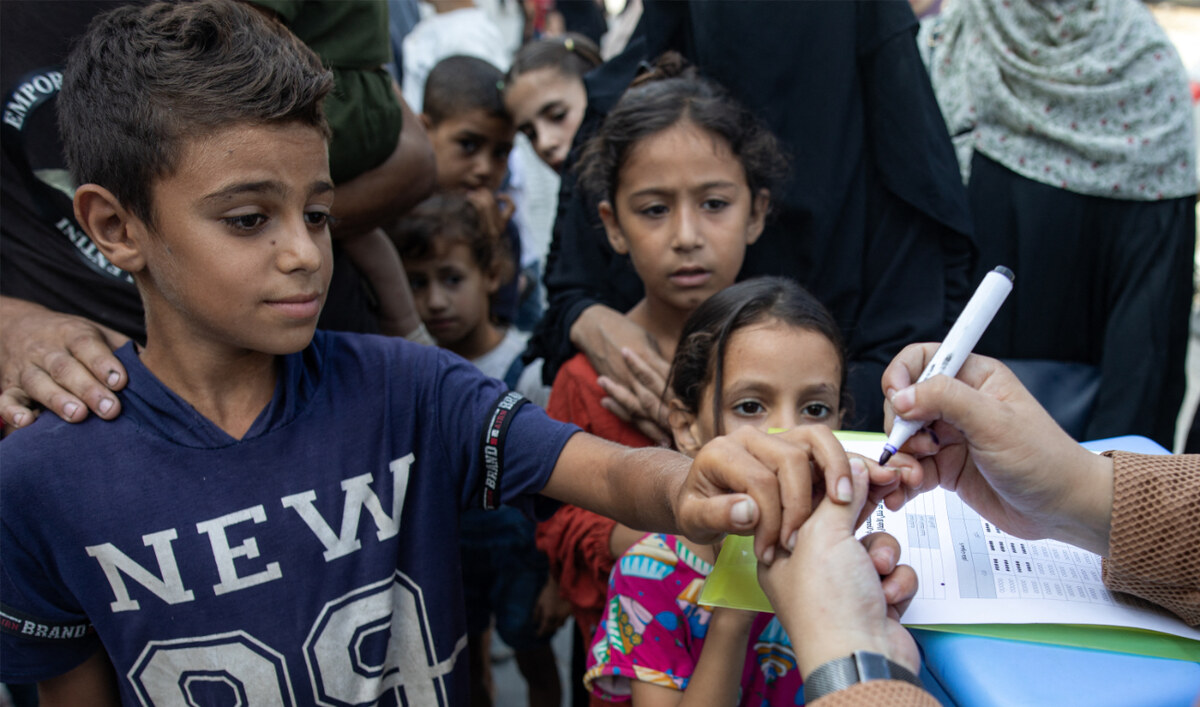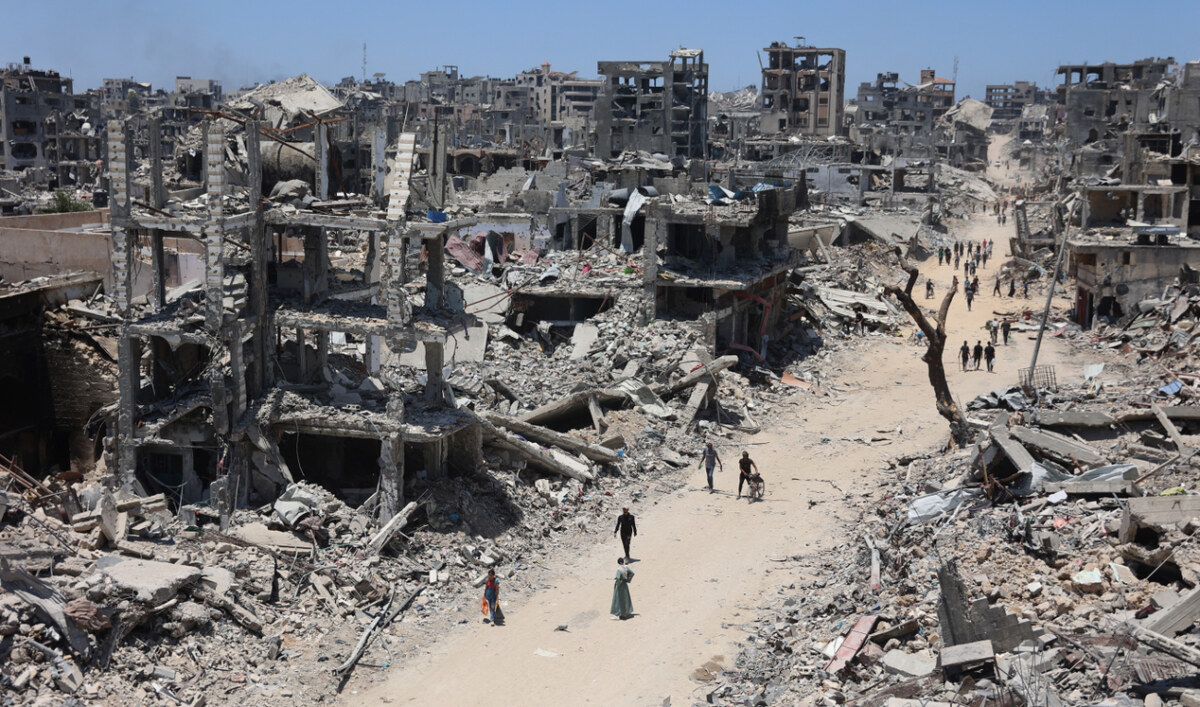LONDON: The UN’s polio vaccination campaign in Gaza has been deemed a success, even though it was conducted in “the most dangerous and difficult (place) on the planet.” However, Palestinian civilians remain at significant risk of injury, illness and death amid the ongoing conflict.
A pause in the fighting between the Israeli military and the Palestinian militant group Hamas in and around the vaccination sites has been critical for the immunization campaign. However, elsewhere in the war-torn territory, the fighting continued.
On Sept. 7, just as medical teams were wrapping up the second phase of the vaccination campaign, Israeli airstrikes across the Gaza Strip killed scores of people — including children.

A man inspects the damage following an Israeli strike on a school housing displaced Palestinians in the Sheikh Radwan neighbourhood in Gaza City on September 7, 2024. (AFP)
The vaccination campaign was launched in Gaza after an 11-month-old baby was diagnosed with the viral disease in August, marking the first case in the Strip for 25 years, raising fears it could spread to neighboring countries.
Adele Khodr, regional director for the Middle East and North Africa at UNICEF, described the three-phase campaign as one of “the most dangerous and difficult vaccination campaigns on the planet.”
“Even with a polio pause, the vaccination campaign faces grave danger and immeasurable obstacles, including damaged roads and health infrastructure, displaced populations, looting and disrupted supply routes,” she said in a statement on Sept. 4.
“Children have suffered enough,” she added, warning that the reemergence of the virus is now “threatening other children in the region.”

A child has their finger marked after receiving a vaccination for polio at a makeshift camp in Khan Yunis in the southern Gaza Strip on September 5, 2024. (AFP)
Polio, which spreads through contact with the feces, saliva or nasal mucus of an infected individual, attacks nerves in the spinal cord and the brain stem, leading to partial or total paralysis within hours.
It can also immobilize chest muscles, causing trouble breathing, even leading to death.
Wild poliovirus cases have fallen by more than 99 percent since 1988, from an estimated 350,000 cases in more than 125 endemic countries, to six reported cases in 2021.
Of the three strains of wild poliovirus, Type 2 was eradicated in 1999 and Type 3 was eradicated in 2020. As of 2022, endemic Type 1 remained in just two countries — Pakistan and Afghanistan.

Children stand next to raw sewage at a camp for displaced Palestinians in Deir Al-Balah in the central Gaza Strip on August 19, 2024. (AFP)
In Gaza, overcrowding, a lack of clean water and hygiene materials, a deteriorating health system, and the destruction of sanitation plants have all contributed to the reemergence of Type 2 in the water supply.
According to UNICEF, the first phase of the polio vaccination program, which ran from Sept. 1 to 3 in central Gaza, reached more than 189,000 children under the age of 10.
The second phase was carried out in southern Gaza, particularly in Khan Younis and Rafah, from Sept. 5 to 8, targeting approximately 340,000 children under 10.
The third phase, which was launched on Sept. 9, is scheduled to run until Sept. 11, targeting some 150,000 children in the north.
IN NUMBERS
- 680K Children in Gaza targeted under the UN’s polio vaccination campaign.
- 92% Primary roads damaged or destroyed, obstructing vaccine distribution.
- 70% Water and sanitation plants damaged or destroyed, contributing to outbreak.
(Source: UN, World Bank)
Coinciding with the vaccine’s rollout on Sept. 1, the director-general of the World Health Organization, Tedros Adhanom Ghebreyesus, wrote on the social media platform X that “ultimately, the best vaccine for these children is peace.”
However, the area-specific truces that allowed the rollout to take place have done little to provide the children of Gaza with hope of a lasting end to the violence.
While vaccination sites have not been targeted, Gazan families, wearied by 11 months of war and worsening humanitarian conditions, had to make the perilous journey with their children to these locations amid the ongoing bombardment.

Lack of clean water and hygiene materials, a deteriorating health system, and the destruction of sanitation plants have all contributed to the reemergence of polio in Gaza. (AFP)
Khodr praised the families for turning out “in high numbers” at vaccination sites, “despite relentless attacks on schools and sites sheltering uprooted children, exhausting displacement orders forcing families to relocate time and again, and widespread hunger levels that have at points pushed parts of Gaza to the brink of famine.”
Not only has the journey to vaccination units been long and exhausting for Gazan families, but also for humanitarian teams delivering and administering the vaccines.
With 92 percent of Gaza’s primary roads damaged or destroyed, according to the World Bank, civilians and medical workers were all forced to use a single route — Al-Bahar Street.
“Unfortunately, only one road in Gaza remains operational, and it’s Al-Bahar Street,” Fady Abed, the Gaza communications officer for the medical NGO MedGlobal, told Arab News.
“This is the sole road servicing about 1.9 million displaced people in Al-Mawasi, western Khan Younis, Rafah and Deir Al-Balah.”

Palestinian residents walk along a road now dirt, past destroyed and razed buildings east of Gaza City on July 11, 2024. (AFP)
An April report by the World Bank and the UN highlighted that severe damage to road networks and the communications infrastructure has hampered the delivery of much-needed basic humanitarian aid to people across Gaza.
When he spoke with Arab News on Sept. 5, Abed of MedGlobal had just returned to Deir Al-Balah in central Gaza from working in Khan Younis.
Describing the logistical challenges his team has been facing, he said the journey between Deir Al-Balah and Khan Younis, normally no more than 15 minutes, now takes over an hour.
Abed also said transportation has been a major challenge due to fuel shortages. “There is no fuel for cars,” he said. “Drivers have resorted to mixing vegetable oil with diesel to keep vehicles running, which results in harmful smoke emissions.
“To vaccinate your child, you risk them suffocating from vehicle fumes.”

MedGlobal’s team delivering polio vaccines in Khan Younis on Sep. 5. (Supplied)
And since the vaccine must be kept cold at all times, MedGlobal could only carry as many doses as they expected to administer. Abed said his team “avoided carrying large quantities of the vaccine to prevent it from spoiling after being kept outside coolers for too long.
“At one point, the number of children arriving at the vaccination unit exceeded the available doses. Members of our team had to make the long, arduous journey back and forth to replenish the supply while families waited.
“This was frustrating for both our team and the families, who were exhausted yet eager to have their children vaccinated.”
Israel mounted its Gaza operation in retaliation for the Oct. 7 Hamas-led attack, which saw 1,200 killed and 250 taken hostage. At least 40,900 Palestinians have been killed and more than 94,450 injured since the conflict began, according to Gaza’s health authority.

Palestinian children receive malnourishment treatment at Al-Aqsa Martyrs Hospital in Deir Al-Balah in the central Gaza Strip on May 30, 2024. (AFP)
Around 90 percent of the population has been displaced at least once, fleeing from one Israeli-designated “safe zone” to another.
The Israeli bombardment has devastated much of Gaza’s infrastructure, bringing the health sector and sanitation services to their knees and causing the resurgence and spread of multiple infectious diseases.
According to UN figures, the conflict has damaged or destroyed 70 percent of Gaza’s water and sanitation plants.

Palestinian children queue at a water distribution point in the Bureij refugee camp in central Gaza Strip on August 25, 2024. (AFP)
In late July, Gaza’s health authority declared the enclave a “polio epidemic zone,” attributing the resurgence of the virus to the damage caused by Israel’s bombing campaign.
UNICEF’s Khodr called on the warring parties to continue to respect the polio pauses. Achieving at least 90 percent vaccination coverage in Gaza would stop the virus from spreading, she said.
“Preparing for this ambitious campaign and securing these pauses was not easy but it demonstrates that it is possible to allow supplies into the Strip, silence the strikes and protect civilians.”





























